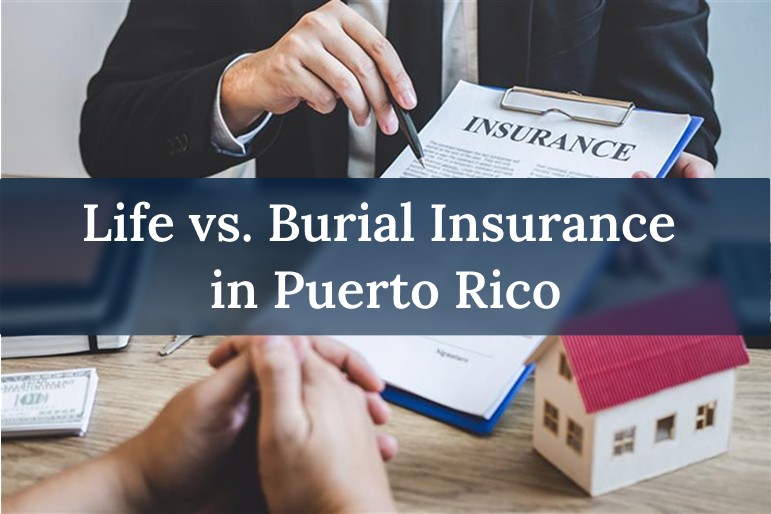
In Puerto Rico, families place a strong emphasis on caring for loved ones, both in life and after death. But when it comes to financial planning, many residents struggle to choose between life insurance and burial (final expense) insurance. With rising funeral costs and economic uncertainty, making the right decision is more important than ever.
This guide will help you understand the key differences between these two types of insurance, so you can protect your family without overpaying or underplanning.
Table of Contents
ToggleWhat Does Life Insurance Actually Cover?
Life insurance offers financial protection for your family after your passing. Depending on the type of policy, it can provide:
- Lump-sum cash benefits to your chosen beneficiary.
- Income replacement to cover bills, mortgages, or child education.
- Debt repayment such as credit cards or loans.
- Estate planning support, helping your heirs avoid financial stress.
There are two primary types:
- Term Life Insurance: Offers coverage for a specific period (e.g., 10, 20, or 30 years). It’s affordable and ideal for income replacement.
- Whole Life Insurance: Offers lifelong coverage and builds cash value over time, making it a more robust long-term asset.
What Is Burial Insurance and How Is It Different?
Final expense insurance, often called burial insurance, is a low-coverage policy intended to help cover the essential costs associated with end-of-life arrangements.
- Funeral and burial services
- Cremation
- Medical bills
- Minor debts
These policies usually offer coverage between $5,000 and $25,000 and are generally easier to qualify for compared to traditional life insurance. These are common among seniors who don’t need large-scale life insurance but want to avoid burdening their family.
Comparing Premium Costs: Life vs. Burial Insurance
Premiums for burial insurance tend to be lower in absolute cost, but higher per $1,000 of coverage compared to life insurance.
- A 35-year-old in good health could pay around $25 monthly for a $250,000 term life policy.
- A 65-year-old might pay $45/month for $10,000 of burial insurance.
In Puerto Rico, where cost-of-living considerations are critical, it’s important to balance affordability with the coverage you actually need.
Which Policy Is Easier to Qualify For?
For many older adults in Puerto Rico, this is a deciding factor.
- Burial Insurance: Usually no medical exam is required. Policies are often guaranteed acceptance up to age 85.
- Life Insurance: Usually requires a medical check and has stricter health underwriting.
If you’ve had health issues or are over 60, burial insurance offers a simpler path to coverage.
Key Benefits and Drawbacks of Burial Insurance?
Pros:
- Simple application with no medical exam.
- Fast approval and payout process.
- Tailored for seniors and those on a fixed income.
Cons:
- Low coverage amounts ($5,000 to $25,000).
- May cost more per dollar of coverage.
That said, it’s a practical solution if your primary concern is funeral costs. For those seeking the best final expense insurance plans in Puerto Rico, it’s worth comparing offerings from local insurers who understand the needs of Puerto Rican families.
Key Benefits and Drawbacks of Life Insurance?
Pros:
- Higher death benefits to cover mortgage, education, and living expenses.
- Term and whole life options available.
- Supports long-term estate and financial planning.
Cons:
- May require medical exams and health screenings.
- Policies can lapse if premiums aren’t paid consistently.
Funeral Costs in Puerto Rico: Why It Matters
In Puerto Rico, the average cost of a funeral is between $5,000 and $10,000, depending on the service type, burial, and associated expenses. That’s a significant expense for most families, especially in emergency situations.
Whether you choose life or burial insurance, make sure the death benefit is adequate to cover:
- Funeral home service fees
- Transportation of the body
- Burial plot or cremation costs
- Headstones and death certificates
Who Should Consider Burial Insurance?
Burial insurance makes sense if:
- You’re over age 60 and only need to cover final expenses.
- You have pre-existing conditions that make traditional life insurance difficult to obtain.
- You’re likely looking for coverage that’s easy to qualify for and quick to secure.
It’s a great safety net for those with limited income or without dependent family members.
Who Should Consider Life Insurance in Puerto Rico?
Life insurance is ideal for individuals who:
- Are younger or middle-aged and have dependents.
- Own property or carry long-term debts like mortgages.
- Want to leave a financial legacy or cover business obligations.
In any of these situations, talking to a life insurance advisor in Puerto Rico can help you determine the right type and amount of coverage.
Can You Have Both Policies at the Same Time?
Yes, and for many Puerto Rican families, having both provides the best of both worlds:
- Use burial insurance for immediate funeral costs.
- Use life insurance for long-term family support and estate planning.
This layered approach ensures no financial gaps during a time of crisis.
Are Insurance Payouts Taxable in Puerto Rico?
Generally, life and burial insurance death benefits are not taxable in Puerto Rico. But it’s essential to consider:
- Estate tax thresholds for high-net-worth individuals.
- Beneficiary designations to avoid legal delays.
- The role of inheritance laws in distributing assets.
Working with a financial advisor ensures your policies align with your broader estate plan.
Mistakes Puerto Ricans Make When Choosing Coverage
Some common missteps include:
- Relying solely on employer life insurance, which ends when you change jobs.
- Choosing the cheapest policy without comparing features.
- Forgetting to update beneficiaries after marriage, divorce, or children.
- Ignoring the long-term costs of funeral inflation.
Steering clear of these errors helps make sure your policy provides the protection your family really needs.
A Real Story from Bayamón: Why It Matters
A 68-year-old woman in Bayamón bought a $15,000 burial insurance policy. When she passed unexpectedly, the policy paid out in days, covering her entire funeral. Her family didn’t have to borrow or scramble, and her wishes were honored.
What stands out most is how this simple policy protected her family’s emotional and financial well-being. It allowed them to focus on grieving and honoring her memory without the added pressure of unexpected bills. In Puerto Rico, where family and legacy mean everything, this kind of planning is more than practical—it’s deeply respectful.
FAQs About Life and Burial Insurance in Puerto Rico
- Is burial insurance the same as a prepaid funeral? No. Burial insurance is a cash payout; prepaid funerals are service contracts.
- Can I get life insurance if I’m over 65? Yes, but your options may be limited. Whole life or final expense insurance could be more suitable options.
- What happens if I outlive a term life policy? The coverage ends unless it’s renewable or convertible to whole life.
- Can burial insurance be used for other expenses besides funeral costs? Yes. While it’s intended for final expenses, beneficiaries can use the funds for any purpose.
- Is it possible to update your beneficiary after buying the policy? Most policies allow you to change beneficiaries at any time.
- Is it possible to have life insurance with no medical exam? Yes, some policies offer no-exam options, especially for smaller coverage amounts.
Final Thoughts
Deciding between life and burial insurance comes down to your age, financial responsibilities, and the specific needs of your loved ones. Both offer peace of mind, but each serves a different purpose.
If you want broad protection for debts, income replacement, and legacy, life insurance is the right choice. If you’re mainly looking to cover funeral and related expenses, a burial insurance policy may be all you need.
To make the best decision for your family, consult with one of the best financial advisors in Puerto Rico who understands both the local economy and your personal values.
Would you like a personalized recommendation? Request a consultation today to explore your options with someone who cares about your future.


